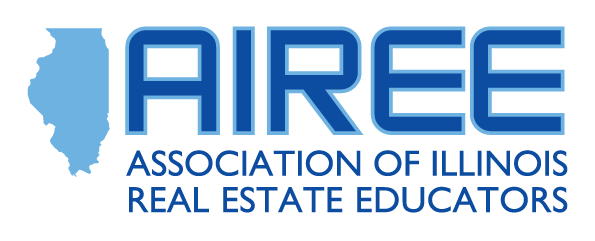- Home
- Creating a Lesson Plan for Illinois Real Estate Courses
Creating a Lesson Plan for Illinois Real Estate Courses

As a real estate instructor, you are responsible for guiding your students through the principles and practice of real estate. A well-structured lesson plan will keep you and your students on track and ensure all topics are covered. It will help you stay organized and help your students understand how to apply what they learn. This guide explores the creation of a lesson plan that will meet industry standards and help your students learn better.
1. Define Your Objectives
Establish Clear Learning Objectives
Learning objectives are the cornerstone of effective instruction. They articulate the knowledge and skills students should acquire upon course completion. For example:
Pre-licensing courses: Focus on foundational topics like agency, contracts, and ethics.
Continuing education: Highlight recent legislative changes and industry trends.
Ensure your objectives are:
Specific: Clearly define what students will learn.
Measurable: Include outcomes that can be assessed.
Aligned: Match the course’s goals and licensing requirements.
Understand Course Standards and Compliance
Real estate courses must meet specific requirements set by the IDFPR, ARELLO, and/or other regulatory and approving organizations. Review and adhere to these standards to ensure your lesson plan aligns with all requirements.
Consider Student Needs
Real estate classes often include students with varying levels of experience. Some may be new to the field, while others have years of experience. When planning lessons, it's essential to consider these diverse backgrounds and needs.
2. Structure Your Lesson Plan
Organize Key Topics
Real estate is a broad field, so it's crucial to prioritize topics based on your course's focus. Tailor your content to the course type and keep it relevant to your students' needs. Prioritize topics relevant to the course type. For example:
Pre-licensing: Agency law, fair housing regulations, and contract principles.
Continuing education: Market updates, new legislation, and advanced practices.
Divide Content into Manageable Sections
Breaking your content into units makes it easier for students to follow and understand. Consider the length of your course and format each session with timing in mind, allowing adequate time for both instruction and interactive elements. Allocate time for:
Instruction (e.g., lectures or presentations).
Interactive activities (e.g., group discussions or role-playing).
Assessments (e.g., quizzes or practice scenarios).
Ensure Logical Progression
Organize your lessons logically, starting with basic concepts and building toward more complex ideas. For example, begin with definitions and legal principles, progress to practical applications, and explore current trends and case studies. This flow helps students build a solid foundation before tackling advanced topics.
3. Select Effective Teaching Methods
Incorporate Interactive Techniques
Engage students by using:
Case studies: Analyze scenarios to reinforce legal principles.
Role-playing: Simulate client interactions to develop skills. For example, simulating client interactions can help students develop their negotiation skills and understand the nuances of agency relationships.
Group discussions: Encourage collaboration and diverse perspectives.
Use Visual Aids and Technology
Visual aids like property maps, zoning diagrams, and market analysis charts can enhance understanding by making abstract concepts more tangible. Multimedia resources, such as videos and infographics, are also excellent tools for breaking down complex ideas and keeping students engaged.
For webinars, tools such as:
Zoom polls.
Digital whiteboards.
Multimedia (e.g., videos and infographics) can enhance engagement.
Adapt for Online or In-Person Delivery:
For virtual classes, integrate interactive tools to keep students involved. In-person sessions may emphasize hands-on exercises and personal interaction.
4. Develop Assessments and Feedback Systems
Design Assessments to Measure Progress
Use a mix of formative and summative assessments:
Formative assessments: Quizzes, quick polls, or practice problems provide immediate feedback.
Summative assessments: Exams or final projects evaluate overall understanding.
Maintain Consistency
Consistency in assessments keeps everyone on track. Use standardized questions and clear guidelines that reflect real estate skills and knowledge. For example, scenario-based questions can test how students apply legal principles in real-world situations, helping them get ready for industry challenges.
Feedback and Improvement
Give constructive feedback quickly and focus on specific areas that need improvement. Encourage students to reflect on their performance and ask questions when needed.
Similarly, getting feedback from students on your lessons and teaching methods can also help you improve for future classes.
5. Stay Compliant and Document Thoroughly
Documenting Lesson Plans and Maintain Compliance
Keep detailed records of your objectives, teaching methods, and assessments. This helps you meet regulatory standards and improve your curriculum over time.
Stay Updated with Real Estate Regulations
The real estate industry is ever-changing with new laws, rules, and market trends. To keep your lessons up to date, it's not just a suggestion but a responsibility to stay informed about these changes. You can do this by regularly subscribing to industry publications, attending webinars, and visiting state real estate board websites.
Regularly review updates from regulators and the industry:
The IDFPR.
Industry associations like ARELLO and NAR.
Attend continuing education programs and professional development/training programs.
Conclusion
Creating a good lesson plan goes beyond organizing content; it's about building a learning experience that connects with students and prepares them for real estate success. Set clear goals, use different teaching methods, and follow industry standards to create engaging lessons. Start working on your plan today and keep it dynamic, relevant, and focused on students.
—-------
Additional Resources
Real Estate Educators Association (REEA): reea.org
National Association of Realtors (NAR): nar.realtor
Illinois Realtors (IR): illinoisrealtors.org
Association of Real Estate License Law Officials (ARELLO): arello.org
